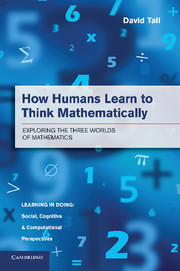Book contents
- Frontmatter
- Dedication
- Contents
- Series Foreword
- Journeys through three worlds of mathematics
- Preface
- Acknowledgements
- Illustration Credits
- I Prelude
- II School Mathematics and Its Consequences
- 2 The Foundations of Mathematical Thinking
- 3 Compression, Connection and Blending of Mathematical Ideas
- 4 Set-Befores, Met-Befores and Long-Term Learning
- 5 Mathematics and Emotion
- 6 The Three Worlds of Mathematics
- 7 Journeys through Embodiment and Symbolism
- 8 Problem Solving and Proof
- III Interlude
- IV University Mathematics and Beyond
- Appendix Where It All Came From
- References
- Index
6 - The Three Worlds of Mathematics
from II - School Mathematics and Its Consequences
Published online by Cambridge University Press: 05 June 2014
- Frontmatter
- Dedication
- Contents
- Series Foreword
- Journeys through three worlds of mathematics
- Preface
- Acknowledgements
- Illustration Credits
- I Prelude
- II School Mathematics and Its Consequences
- 2 The Foundations of Mathematical Thinking
- 3 Compression, Connection and Blending of Mathematical Ideas
- 4 Set-Befores, Met-Befores and Long-Term Learning
- 5 Mathematics and Emotion
- 6 The Three Worlds of Mathematics
- 7 Journeys through Embodiment and Symbolism
- 8 Problem Solving and Proof
- III Interlude
- IV University Mathematics and Beyond
- Appendix Where It All Came From
- References
- Index
Summary
We now have the constructs to formulate the development of mathematical thinking in terms of ‘three worlds of mathematics’ arising from a sensori-motor-linguistic foundation building on the set-befores of recognition, repetition and language and the met-befores from previous experience that may be supportive or problematic in new situations.
Mathematical thinking involves the compression of mathematical structures into thinkable concepts connected into knowledge structures that are blended together, leading to sophisticated crystalline concepts that have an inevitable mathematical structure.
The Three Worlds
The three set-befores common to us all are foundational in the development of three mental worlds of mathematics:
A world of (conceptual) embodiment building on human perceptions and actions developing mental images verbalized in increasingly sophisticated ways to become perfect mental entities in our imagination;
A world of (operational) symbolism developing from embodied human actions into symbolic procedures of calculation and manipulation that may be compressed into procepts to enable flexible operational thinking;
A world of (axiomatic) formalism building formal knowledge in axiomatic systems specified by set-theoretic definition, whose properties are deduced by mathematical proof.
Information
- Type
- Chapter
- Information
- How Humans Learn to Think MathematicallyExploring the Three Worlds of Mathematics, pp. 133 - 154Publisher: Cambridge University PressPrint publication year: 2013
